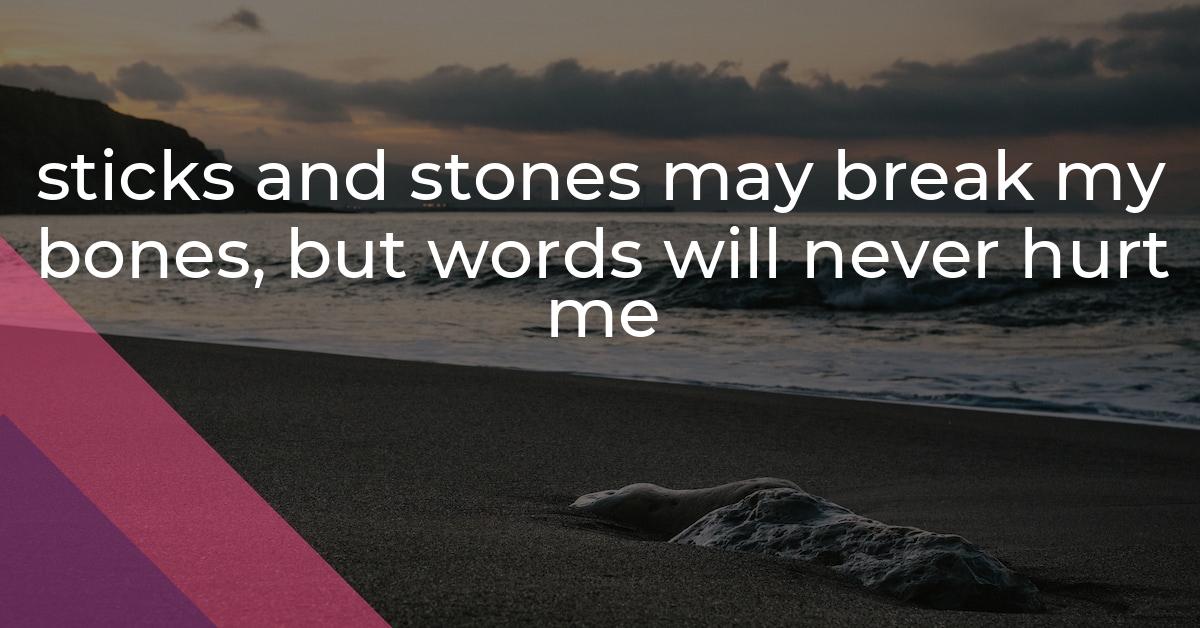sticks and stones may break my bones, but words will never hurt me: Idiom Meaning and Origin
What does ‘sticks and stones may break my bones, but words will never hurt me’ mean?
The idiom "sticks and stones may break my bones, but words will never hurt me" means that physical harm is easier to withstand than emotional or verbal harm.

Idiom Explorer
The idiom "the pen is mightier than the sword" means that words and ideas have more power to influence and provoke change than violence or force.
The idiom "take lightly" means to not take something seriously or to underestimate its importance or impact.
The idiom "suffer in silence" means to endure pain, hardship, or injustice without complaining or seeking help from others.
The idiom "stuck in the Stone Age" means someone is resistant to change and holds outdated beliefs or practices. It metaphorically refers to being trapped in a time period known for primitiveness and lacking modern advancements.
The idiom "stick with" means to continue with or remain loyal to something or someone. It implies not giving up or changing one's mind despite difficulties or temptations.
The idiom "stick to someone's ribs" means that food is heavy or substantial enough to satisfy hunger and provide lasting nourishment.
The idiom "stick to one's text" means to follow a prepared speech or written material without deviating or going off-topic.
FAIL
The idiom "sticks and stones may break my bones, but words will never hurt me" is a well-known proverbial expression that has been used for centuries. It conveys the idea that physical harm caused by objects like sticks and stones can be painful, but the power of words to inflict emotional harm is negligible. The phrase is often used as a response to verbal insults or hurtful criticism, emphasizing resilience and the ability to brush off or ignore hurtful words.
The origin of this idiom can be traced back to the mid-19th century in the United States. While the exact source is uncertain, similar expressions were used in various forms and contexts before it gained popularity. A version of the phrase appeared in The Christian Recorder, a periodical published in 1862 by the African Methodist Episcopal Church. The line appeared in a poem titled "Sticks and Stones," and is credited to an unknown author.
Over time, the idiom has become deeply ingrained in popular culture and has been widely disseminated through childhood rhymes, literature, and media. It is often taught to children as a way to encourage emotional resilience and to discourage taking hurtful words to heart. Despite its ubiquity, the idiom has faced some criticism for oversimplifying the impact of verbal abuse and diminishing the emotional harm that words can cause.
Yet, the reality is more complex. The metaphorical meaning of the idiom is clear: physical injuries heal, but the emotional impact of hurtful words can linger. However, it is important to note that the power of words to cause emotional harm should not be underestimated. While physical pain is more tangible and visible, the invisible scars left by hurtful words can have a lasting impact on an individual's self-esteem, confidence, and mental well-being.
In fact, the idiom itself acknowledges the power of words when it is compared to other idioms that highlight the influence of language. For example, "the pen is mightier than the sword" emphasizes that words can have a greater impact or influence than physical force. It recognizes that words can shape opinions, incite change, and bring about societal transformation. This idiom reminds us that a well-crafted argument or persuasive speech can have a profound effect on people.
Another related idiom, "speech is silver, silence is golden," suggests that sometimes it is better to remain silent than to say something that may cause harm or damage. It highlights the importance of carefully choosing our words and considering the potential consequences of what we say. This idiom encourages us to think before we speak and to use our words thoughtfully and responsibly.
Similarly, the idiom "stick to one's guns" encourages individuals to stand their ground and stick to their beliefs or principles, even in the face of opposition or criticism. It emphasizes the importance of staying true to oneself and not allowing others' words or actions to sway or discourage us.
As with many idioms, "sticks and stones may break my bones, but words will never hurt me" is an oversimplified generalization that does not apply to every situation or individual. The idiom assumes a level of emotional resilience that may not be present in everyone, and the degree of harm caused by words can vary greatly depending on the context, the relationship between individuals, and the vulnerability of the person targeted.
Furthermore, the idiom does not acknowledge the ways in which verbal abuse can be a form of psychological manipulation, coercion, or bullying. Words can be used to inflict pain, damage relationships, and perpetuate systems of power and oppression. It is crucial to recognize the impact that words can have and to promote a culture of empathy, understanding, and responsible communication.
While the idiom "sticks and stones may break my bones, but words will never hurt me" has a long-standing place in popular culture, it is important to recognize its limitations. Words do have the power to hurt, and the impact of verbal abuse should not be dismissed or trivialized. It is essential to promote kindness, empathy, and responsible communication in order to create a society where words are used to heal, uplift, and bring people together.
Example usage
Examples of the idiom "sticks and stones may break my bones, but words will never hurt me" used in a sentence:
1. Despite the harsh criticism from her classmates, Sarah remained strong and reminded herself that "sticks and stones may break my bones, but words will never hurt me".
2. Michael faced multiple challenges and negative comments in his career, but he always kept in mind the saying "sticks and stones may break my bones, but words will never hurt me" to stay motivated.
3. When faced with online bullying, Jennifer remembered the idiom "sticks and stones may break my bones, but words will never hurt me" to maintain her self-confidence and not let the hurtful comments affect her.
More "Proverbs" idioms



